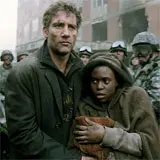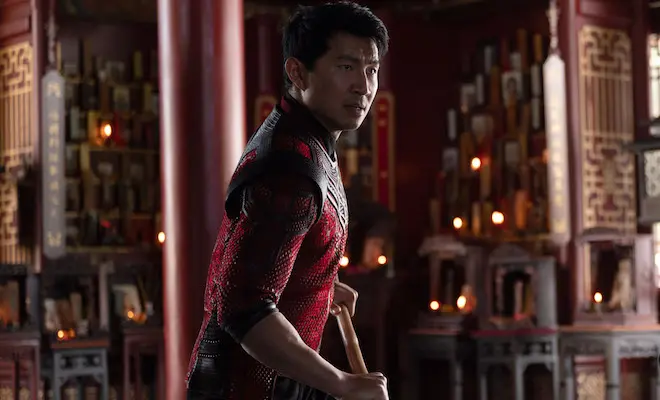 The world of dystopia; a place where human civilization has finally hit rock bottom or are pretty damn close to doing so. Offspring of George Orwell’s 1984, the dystopian societies found in such films as Brazil, A Clockwork Orange, Blade Runner and the recent V for Vendetta are dark, dreary places of oppressive, totalitarian rule that despite their fictional origins often serve as a mirror to troubles in the real world.
The world of dystopia; a place where human civilization has finally hit rock bottom or are pretty damn close to doing so. Offspring of George Orwell’s 1984, the dystopian societies found in such films as Brazil, A Clockwork Orange, Blade Runner and the recent V for Vendetta are dark, dreary places of oppressive, totalitarian rule that despite their fictional origins often serve as a mirror to troubles in the real world.
With the exception of Vendetta, few of the aforementioned movies exactly set the box office on fire proving yet again that even if critics rally behind it, people do not go to the movies to be reminded about how dreary the real world is or could be. This certainly was the case with Alfonso Cuaron’s brilliant cautionary tale Children of Men, finally available on Blu-ray from Universal Studios Home Entertainment. The critics and the audiences who turned out for the film in early 2007 were quite impressed. Unfortunately, that support was only good enough to muster $35 million domestically, which was a far cry below the movie’s $70 million production costs.
Children of Men is set in England of 2027 where two decades of global infertility has left the human race with less than a century left before extinction. This unexplained phenomenon has led to global terrorism, environmental destruction, and the influx of millions of refugees. The ones who managed to safely make it to England now find themselves the target of the country’s active and oppressive crackdown on illegal immigrants. The world has gone to hell in a hand basket via Federal Express, but Theo Faron (Clive Owen) could personally care less.
A former political activist turned civil servant, Theo has slowly fallen into a world of alcohol and apathy following the death of his own son, Dylan, 19 years prior. He is brought out of his decades-long stupor by Julian (Julianne Moore), his former lover and Dylan’s mother. Julian is now the leader of a revolutionary group known as The Fishes and needs Theo’s help in securing papers for a refugee named Kee (Claire-Hope Ashitey), who also happens to be the world’s first pregnant woman in nearly twenty years. Theo refuses at first, but then decides to help Julian and her group because he is in desperate need of money. Through events both tragic and revelatory, Theo finds himself the protector of Kee as well as rediscovering his humanity in the process.
On the surface, Children of Men is both a road movie and a chase movie, peppered with fascinating characters that are brought to life by a superb ensemble cast and highlighted by two spectacularly mounted, single-shot action sequences beautifully captured by Emmanuel Lubezski’s (Sleepy Hollow, The New World) brilliant cinematography.
But lying beneath this exhilarating, intense exterior are some intelligent political and social subtexts. Cuaron is a filmmaker that certainly had a lot on his mind regarding our current global society when he made this film. And he does a spectacular job weaving his points of view on such issues as immigration, the environment, terrorism and the War on Terror into the basic premise of P.D. James’ 1992 novel without beating us over the head with or shoving down our throat the film’s message. By combining his very loose adaptation of the novel with recent events, Cuaron presents a futuristic society not all that different from the one we currently live in, making the movie’s premise all the more involving, believable and unsettling.
But Children of Men is much more than just leftist, political sermonizing (which will either make you stop and think, or just outright piss you off) and technically brilliant filmmaking. If one looks past the story’s grim nature, you will see what the film is ultimately about: hope, selflessness and redemption, the latter examined through the character of Theo. We watch Theo go from being bitter and apathetic to the world around him to once again become a caring individual willing to risk his life several times over to ensure that Kee, and in turn the future of humanity, survives. As brilliantly underplayed by Clive Owen, Theo’s inner journey is just as believable and fascinating as his outer one.
Children of Men is not a fun – or easy – film to sit through. But thanks to Cuaron’s vision and respect for his viewer’s intelligence, he certainly makes it a compelling, necessary one. Whether you agree or disagree with what the Mexican filmmaker is saying in the film is strictly a matter of personal opinion, but it is hard to disagree that the movie is a wholly original work that packs quite a wallop.
Children of Men is another in the long line of titles from Universal that have made the transition from the now-defunct HD DVD format over to Blu-ray. As was the case with the HD DVD presentation, the film is presented in a 1080p/VC-1 encode and its original aspect ratio of approximately 1.85:1 (opened up a bit to 1.78:1). This time, however, the transfer is given more breathing room, spread across a BD-50 gig disc instead of an HD-30 GB disc.
I no longer have the HD DVD edition which prohibits me from making comparisons between the two presentations. I do, however, remember the HD DVD being quite impressive. The same can definitely be said about the Blu-ray transfer as well. The color palette used by Cuaron is on the drab side, with grays, a cold steel type of blue, blacks and browns dominating the color scheme. This transfer perfectly captures the intended cinematic effect created by Cuaron and Lubezki. Picture detail and black levels are excellent, and flesh tones are consistent throughout. I do not detect any DNR, edge enhancement or compression artifacts with the transfer.
I remember being very impressed by the sound design on Children of Men when I saw it in the theater a few years back. Dialogue, music and sound effects came at you from all directions, making for an immersive viewing experience. The Dolby Digital Plus track on the HD DVD release has been replaced with a 5.1 DTS-HD Master Audio track and it is a beauty. As you would expect from a recent big-budget film, the center-channel dialogue is nice and clear, while the front and rear surrounds are quite active. And while the bass is not used non-stop, it does make its presence known in all the appropriate places (in particular, the uprising in the internment camp during the film’s conclusion).
D-BOX Motion Code
Children of Men’s sparse action sequences offer few appropriate opportunities for D-BOX to be utilized. When you expect D-BOX to kick it does, and then some.
The opening café bombing is a burst of jarring movement from D-BOX. When combined with the new uncompressed .LFE channel’s thunderous roar, it will rattle your nerves whether you know precisely when the bomb will go off or not.
After the bombing, D-BOX is relatively quiet apart from one notable sequence until the final act and escape from the internment camp. Chair movement is limited to reproducing the “bounce” of riding in a car on multiple occasions, a brief rock throwing attack on a commuter train that neatly mimics the intensity and size of rocks through subtle movements, and the first spectacular single-shot sequence involving rioters attacking a vehicle. All are well crafted movement effects but not overly memorable compared to some of the more intense D-BOX experience available from other films.
The second single-shot sequence in the final act is memorable not only for its incredible complexity and attention to detail, but for what running, gunfire and tanks allows D-BOX to offer. One tank in particular firing a pair of rounds into a building at close range shakes the chair to its limit, while varying degrees of gunfire keep the chair active until the long sequence comes to a close.
Children of Men’s D-BOX Motion Code track is almost perfectly executed but the engineers did get carried away once with movement as Theo makes his way through the aforementioned building. Whether moving forward or up a flight of stairs, the chair simulates a floating or flying sensation to incite additional intensity to what is already an emotionally involved scene. I would have preferred the Motion Code stuck to mimicking Theo’s left foot / right foot running movements rather than blanket “floating” replication.
As a big fan of this film, I found the supplemental material that accompanied the movie to be decent if a bit lacking. All of the HD DVD’s bonus material has been carried over to the Blu-ray release, albeit in 480p standard definition video.
Featuring improved functionality on the Blu-ray Disc, Universal’s HD exclusive U-Control feature, when turned on, offers the viewer several things spread throughout the film’s 109 minute running time. Information allows the viewer to take a closer look at some of the headlines of the faux newspapers and homeland security posters that appear in the background of a particular scene. Unfortunately, we cannot read the articles of the newspaper headlines, but I still welcomed the chance to look a bit closer at these. Commercials allows the viewer to check out the different commercials and billboards that also occupy various backgrounds of certain scenes, while Picture in Picture offers up bits of behind the scenes segments and interviews with the cast and crew.
While these are all great features, I have to admit that I wanted a lot more from the “Picture in Picture” feature. I appreciated what I got, but if one is to add up all the segments they run well under an hour. Worse, there is no video commentary during the climatic battle sequence. I’m not sure if Cuaron wanted to keep secret how this remarkable sequence was created and shot, or if someone at Universal misplaced the footage they had, but this is one major missed opportunity.
The Possibility of Hope is a bleak but fascinating 27-minute documentary directed by Cuaron. Several philosophers and sociologists from around the world give their opinions and views on how the themes explored in Children of Men relate to our current global situation. While the overall outlook summed up by these people is less than rosy, the documentary does conclude on a cautiously optimistic note. Not your typical supplemental material, “Possibility” is quite the fascinating featurette.
The six-minute Children of Men: Comments by Slavoj Zizek offers the Slovenian Sociologist’s analysis of Cuaron’s film that gives the viewer a new slant or two on what the film is all about. Under Attack is a nine-minute look at how the filmmakers shot both the car attack sequence and the café bombing that opens the film without ruining the technical beauty of either sequence even after you have seen it (As with all movies, however, I recommend watching the film before you watch the extras).
Futuristic Design is an approximately ten-minute look at the film’s superb production design. Visual Effects: Creating the Baby is a short (three and a half minutes) examination of the visual effects work put into the scene involving the birth of Kee’s baby, while the four minute Theo and Julian briefly features interviews with Clive Owen and Julianne Moore discussing their characters and the process of working with Cuaron which makes for a decent one-time viewing. Two and a half minutes of Deleted Scenes close out the supplements, presented in pretty rough shape and 4×3 widescreen. The scenes add little to the film and were no doubt snipped for pacing reasons.
Children of Men is many things: a unique road picture, an exciting chase movie and a cautionary tale about what might happen – and soon – if we do not stop and take a long look at what we are doing to both ourselves and this planet. Most importantly, it is a film about hope, redemption and humanity. It is a remarkable work of cinema that remains as engrossing and exhilarating on repeat viewings as it did the first. Universal’s Blu-ray presentation is rock solid, and one well worth the upgrade if you have the HD DVD edition.
– Shawn Fitzgerald, with D-BOX segment by Dan Bradley


